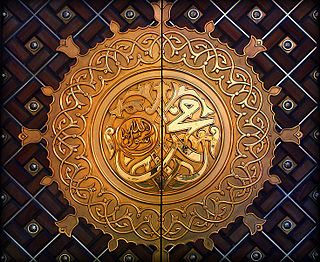
Abū Jaʿfar Hārūn ibn Muḥammad ar-Rāshīd, or simply Hārūn ibn al-Mahdī, famously known as Hārūn ar-Rāshīd, was the fifth Abbasid caliph of the Abbasid Caliphate, reigning from September 786 until his death in March 809. His reign is traditionally regarded to be the beginning of the Islamic Golden Age. His epithet al-Rashid translates to "the Orthodox", "the Just", "the Upright", or "the Rightly-Guided".

Abu al-ʿAbbās Abd Allāh ibn Muḥammad ibn ʿAlī ibn ʿAbd Allāh ibn ʿal-ʿAbbās, known by his laqab al-Saffah, was the first caliph of the Abbasid Caliphate, one of the longest and most important caliphates in Islamic history.

Abū al-ʿAbbās Abd Allāh ibn Hārūn al-Maʾmūn, better known by his regnal name al-Ma'mun, was the seventh Abbasid caliph, who reigned from 813 until his death in 833. He succeeded his half-brother al-Amin after a civil war, during which the cohesion of the Abbasid Caliphate was weakened by rebellions and the rise of local strongmen; much of his domestic reign was consumed in pacification campaigns. Well educated and with a considerable interest in scholarship, al-Ma'mun promoted the Translation Movement, the flowering of learning and the sciences in Baghdad, and the publishing of al-Khwarizmi's book now known as "Algebra". He is also known for supporting the doctrine of Mu'tazilism and for imprisoning Imam Ahmad ibn Hanbal, the rise of religious persecution (mihna), and for the resumption of large-scale warfare with the Byzantine Empire.
Abū al-ʿAbbās is an Arabic name that may refer to:

The Barmakids, also spelled Barmecides, were an influential Iranian family from Balkh, where they were originally hereditary Buddhist leaders, and subsequently came to great political power under the Abbasid caliphs of Baghdad. Khalid, the son of Barmak became the chief minister (vizier) of Al Saffah, the first Caliph of the Abbasid dynasty. His son Yahya aided Harun al-Rashid in capturing the throne and rose to power as the most powerful man in the Caliphate.
Taher is a name meaning "pure" or "virtuous". The origin of this name is Arabic. There are several Semitic variations that include connotations given in Africa, Asia, and Europe. It is traditionally a given name in Muslim and Jewish communities originating from the Middle East and Africa.
Jaʽfar, meaning in Arabic ”stream," is a masculine name of Arabic origin, common among middle eastern and Muslim men, especially in Iran.
Abu al-Fadl or Abu'l-Fadl is an Arabic male given name which also occurs in place-names. It means father of virtue. It is variously transliterated as Abu'l-Fadl, Abu'l-Fazl, Abul Fazal etc. It is also used in Iran and Azerbaijan, usually in the form of Abolfazl, or Abulfaz. Most famously, this is an epithet Abbas ibn Ali, who is highly revered in Islam for his loyalty towards his brother Husayn ibn Ali during the Battle of Karbala.

Abū Bakr is an Arabic given name meaning "Father of a Young Camel" that is widely used by Sunni Muslims.
Shams al-Din is an Arabic personal name or title.

Muhammad, also spelled Muhammed, Muhamad, Mohammad, Mohammed, Mahammad, Maxammed, Mehemmed, Mohamad, Mohamed, or in a variety of other ways, is an Arabic given male name meaning 'praiseworthy'. The name comes from the passive participle of the Arabic verb ḥammada (حَمَّدَ), meaning 'to praise', which itself comes from the triconsonantal Semitic root Ḥ-M-D. Believed to be the most popular name in the world, by 2014 it was estimated to have been given to 150 million men and boys.
Harun, also transliterated as Haroon or Haroun or Hamroun, is a common male given name of Arabic origin, related to the Hebrew name of the Prophet Aaron. Both are most likely of Egyptian origin, from ꜥḥꜣrw, meaning "warrior lion".
Fadel is an Arabic masculine given name, meaning "generous, honorable, superior". Notable people with the name include:

Musa ibn Ja'far al-Kazim was a descendant of the Islamic prophet Muhammad and the seventh imam in Twelver Shia Islam. Musa is often known by the title al-Kazim, apparently a reference to his patience and gentle disposition. He was born in 745 CE in Medina to Ja'far al-Sadiq, the sixth Shia imam, who died in 765 without publicly designating a successor to save his heir from the wrath of the Abbasid caliphs. The subsequent crisis of succession was eventually resolved in favor of al-Kazim, with a dissenting group, now known as the Isma'ilis, separating from the mainstream Shia.

Ibrahim is the Arabic name of the prophet and patriarch Abraham and one of Allah's messengers in the Quran. It is a common male first name and surname among Muslims and Arab Christians, a cognate of the name Abraham or Avram in Judaism and Christianity in the Middle East. In the Levant and Maghreb, Brahim and Barhoum are common diminutives for the first name Ibrahim.

Abu al-Qasim is an kunya meaning "father of al-Qasim". It was an attributive kunya of Islamic prophet Muhammad, describing him as father to his son Al-Qasim ibn Muhammad. Since then the name has been used by the following:
Al-Andalusi is an Arabic-language surname common in North African countries that literally means “the Andalusian”, and it denotes an origin or ancestry from al-Andalus or from the modern-day region of Andalusia. Andalusian culture was heavily influenced by Syrian Arab culture, and most Arab tribes present in al-Andalus had a Syrian or Yemeni origin. Al-Andalusi may refer to:
Ahmad ibn Muhammad can refer to:








